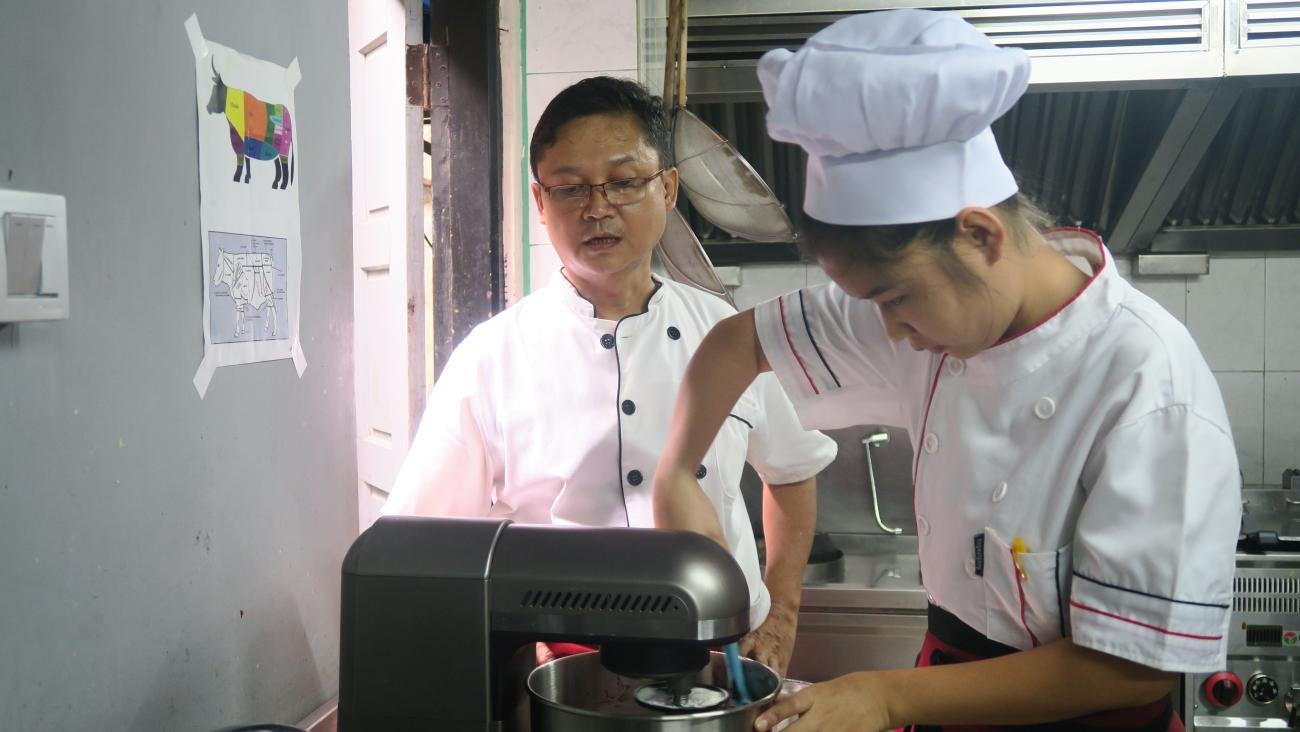“Women hold up half the sky,” so the saying goes and it is certainly true that remittances from women migrant workers bolster the economy of many areas of rural Myanmar.
As the world draws attention to the global pandemic of violence against women during the ongoing 16 Days of Activism against Gender-based Violence, many Myanmar migrant women are stranded overseas, unable to return due to border closures. Many more are working long hours in factories, plantations, farms, private households, on construction sites in care facilities, hotels, shops. With over one million Myanmar women workers overseas, their experiences are diverse and individual, inspiring and heart-breaking, exciting and mundane, dangerous and safe. It is in this context that the International Labour Organization (ILO), International Organization for Migration (IOM) and UN Women have joined forces to make migration safe, fair and a fulfilling and rewarding experience for all migrant women.
As the World Bank and others have consistently shown, global migration has lifted millions out of poverty and boosted economic growth. In Southeast Asia alone, there is an estimated 20.2 million migrant workers, of which nearly 6.9 million migrate to surrounding countries. According to the Ministry of Labour, Immigration and Population, there are over 4 million Myanmar nationals working abroad, a third of whom are women but many more migrate outside official routes. Migration benefits both the countries of origin and destination and for Myanmar, where 25 per cent of the population are international or internal migrants, 2019 World Bank data showed that remittances from migrants amounted to USD 2.8 billion, representing 4 per cent of the country’s GDP.
While the economic impact of migration can be positive, migration is not always safe making migrants and particularly women vulnerable to violence at different parts of their journeys for different reasons.
Women migrants can be exploited by labour recruiters, brokers, smugglers or traffickers, their employers or other employees, before departure, in transit and in the countries of destination. In many instances, their plight is further exacerbated by lack of avenues to seek help due to language challenges or general lack of access and information. The more dependent migrant women are on the employer, especially unscrupulous ones, the more desperate their situation. If there are limited safe, legal and regular migration channels, women may migrate irregularly, making it harder for them to seek help when they might need it.
Ultimately, the violence women migrants face during migration is connected to the deeply rooted patriarchal underpinnings of gender inequality. This affects women’s ability to benefit from opportunities and to be free from violence. In order to make positive and lasting system changes, governments, employers, labour organisations, and civil society, must act to break through the patriarchal system that undermines gender equality in Myanmar and the wider region.
But we must seek different ways to tackle the issues around safety of migrant women. One of the biggest risks is the undertaking of migration through informal channels as many migrants lack the required legal documents with some sources suggesting that a majority of Myanmar migrants migrate irregularly. This is a key factor that puts women at risk, exposing them to several forms of violence such as exploitation, abuse, harassment, trafficking and forced labour with little recourse to seek for help.
Women need more safe passages to migrate. They need labour migration policies and approaches to protect them. While gender-sensitive pre-departure preparation, workshops and messages that educate women on safe and fair migration can help women workers to make informed decisions about migration, we must also acknowledge that the onus must never exclusively be on the migrant women to stay safe but on the perpetrators not to abuse and on the processes to be transparent and effective and for all involved to commit to safe migration. Therefore, access to support services such as legal recourse and counselling need to be further strengthened for these women.
It is also essential that we address workplace harassment and the culture of impunity of perpetrators as this determines the wellbeing of women migrant workers. Jobs that are predominantly performed by women, for example domestic work, careers, the entertainment industry are often not recognised in labour laws or valued by society. This needs to change.
Considering the benefits countries of destination gain from migration, they should help migrants in this transition and provide protective mechanisms against those who aim to take advantage of them. Migrant women who are exploited, abused and utterly dependent on their employer or trafficker, can feel helpless and powerless, unable to speak up, fight or take any form of action because that would make them unemployed or face consequences of having migrated irregularly.
One of the factors closer to home that contributes to making migrant women vulnerable is the sense of duty they have for their families trying to support their parents, siblings, and family members, even at their own expense. The transformation of traditional gender roles is therefore key for empowerment and protection of women against risky migration. At the same time, migration can help women to gain greater financial independence and confidence and offer opportunities outside traditional gender roles. Hence, migration can also enable women’s empowerment if protection measures are strengthened to provide more safe passages.
Some of these challenges, including an increased care burden on women, have been magnified by the COVID-19 pandemic. Since April, an estimated total of 180,000 migrants, more than 40 per cent of whom were women, have returned home to Myanmar. Globally, due to worries of migrants transmitting COVID-19, there has been anti-migrant sentiment, which has even forced some to hide and not seek help even when it was available, making them even more vulnerable to infection and other associated risks.
One of the main issues facing returning migrants is loss of income for an indefinite and extended period. This has not only affected the returning migrants themselves but also their families who relied on their earnings. In addition to the hardship faced due to poverty, such economic insecurity also amounts to vulnerabilities that can make returnee migrant women particularly at risk of gender-based violence including domestic violence. Globally, a very worrying rise in domestic violence has been recorded during the COVID-19 pandemic. For women whose husbands or other male relatives are abusive, the restrictions on movement and socialising have resulted in women being isolated in their homes without any means of escape or access to help. The Gender Equality Network in Myanmar have been contacted by women in Myanmar in such situations.
Notably, women and civil society organizations in Myanmar have played a vital role as leaders and frontline responders advocating for and facilitating the safe return of migrants – women and men. It is essential that they are fully supported to enable them to provide adequate support to the returning migrants and ensure that pregnant women and mothers and children, are supported in finding refuge during these precarious times. Some returned migrants have also contributed to the efforts and joined the response, working in quarantine facilities where they are housed.
Migrant women from Myanmar fill huge gaps in the job market carrying out essential roles particularly in domestic, care and hospitality work. The role of migrant women remains undervalued, they often earn less than their male counterparts and face exploitation, extortion and gender-based violence.
Women play a central role in Myanmar society and its economic development and it is our hope that together we can ensure that the contributions of Myanmar’s migrant women – home and abroad – are applauded, recognised and acknowledged, and that we create conducive environments for these strong and ambitious women to seek safe opportunities for themselves and their families.
As we conclude this year’s 16 Days of Activism, it is time to accelerate our collective efforts to dismantle the structural inequalities that result in exploitation, disempowerment and violence against Myanmar migrant women.



